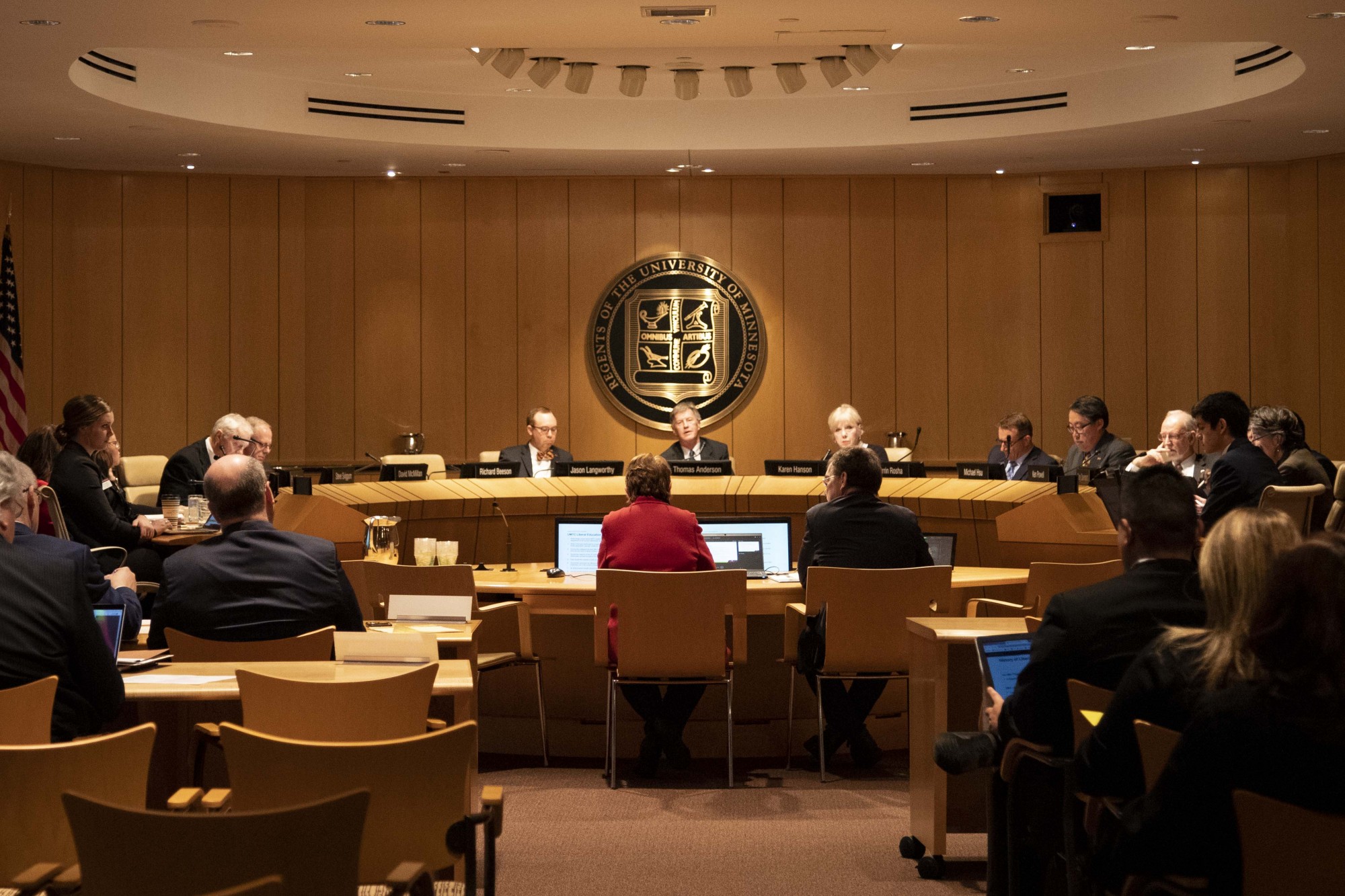The Board of Regents finished its June meeting Friday, hearing reports from University of Minnesota leaders and voting on measures that will impact the University’s operation in the coming years.
The COVID-19 Adjusted Operating Budget and the systemwide strategic plan received committee approval June 11 and were officially passed at the Friday meeting.
Regents pass systemwide strategic plan
After a yearslong process, the board approved President Joan Gabel’s systemwide strategic plan, which lays out several commitments and action items that will guide the University in the coming years.
The plan lays out five commitments including student success, innovation, community impact, sustainability and fiscal stewardship. Each commitment is assigned several goals and corresponding action items. The plan resulted from a planning process that began in 2016, which collected feedback from campus stakeholders and legislators.
Although some regents criticized the plan for its lack of detail, the plan passed with an 11-1 vote.
“We’ve accomplished a lot in the last year to get to this moment, and I look forward to continuing our work together and next steps. This is really just the beginning and the next steps … will help us implement this plan on behalf of the University and in support of our state,” Gabel said at the meeting.
Gabel and chair report
Gabel and board chair Regent Kendall Powell each presented a report outlining administrative activities coming in the next month.
On June 18, Gabel and other University administrators will address proposals from faculty and students surrounding campus safety in a special meeting of the Senate Consultative Committee. Gabel said the meeting is in response to multiple resolutions and proposals the administration has received from students, faculty and the University Senate.
Gabel has lifted the bans on domestic vehicle travel and nonessential air business travel. The ban on nonessential air business international travel has been extended through Aug. 15.
The University is also working with the Minnesota State Capitol to pass a bonding bill in a special session set for this summer.
Additionally, the Presidential Performance Review Committee will deliver its report at the scheduled July meeting, Powell said at the meeting.
Committee final votes
The board finalized several items following the June 11 committee approval.
After making several resolutions to Gabel’s framework for the fall semester, the board passed the plan in a 12-0 vote. As part of the resolutions, the start date of the semester will remain as Sept. 8. Gabel had previously suggested beginning the semester early to allow flexibility in the academic calendar. The Crookston campus may decide on a different start date, Gabel said.
Gabel’s proposed budget was also unanimously approved, in addition to the capital improvement budget and temporary salary cuts and furloughs for employees.
The board approved several real estate transactions, including the purchase of property on Essex Avenue and the sale of 435 acres in Rosemount, Minnesota.
Title IX policy changes
The University will have to revise portions of Title IX policy relating to sexual harassment and misconduct by Aug. 14.
The U.S. Department of Education is asking many institutions to update some portions of the policy, according to meeting materials. The areas that are influenced include evidence standards, the role of advisors in hearings and the centralization of grievance policies.
The board is seeking recommendations from legal consultants before finalizing decisions relating to Title IX. More discussion on the topic is likely prior to Aug. 14, Powell said at the meeting.
Diversity and inclusion discussions
Leaders from the Office for Equity and Diversity addressed the board on ongoing measures being taken to recruit and maintain a diverse group of students as well as the challenges some racial groups are facing in the wake of the COVID-19 pandemic and George Floyd’s death.
In a recent COVID-19 Wellness Survey conducted by OED, Black and Asian students reported feeling unsafe to go outside or wear a face mask for fear of being attacked or retaliated against.
Gabel and regents sustained that diversity and inclusion will continue to be a top priority at the University and is accurately reflected in the newly approved strategic plan.
“We need to go about reestablishing these [student] relationships if we are going to properly support our students and meet their needs in the coming years,” said Michael Rodriguez, associate dean and professor in the College of Education and Human Development at the meeting.


